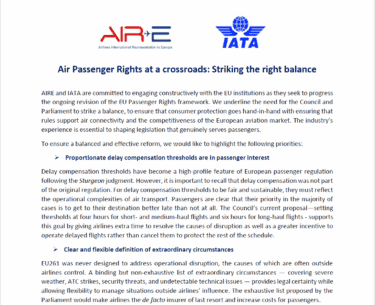On 16 October 2025, the Court of Justice of the European Union (CJEU) delivered a preliminary ruling in Case C‑218/24, clarifying whether a pet transported in the hold of an aircraft can be legally classified as “baggage” under the Montreal Convention — specifically Articles 17(2) and 22(2). The case was referred by a Spanish commercial court (Juzgado de lo Mercantil nº 4 de Madrid) in the context of litigation between a passenger and the airline Iberia, with IATA España as an interested party.
The ruling establishes that a pet accompanying a passenger and transported in the aircraft’s cargo hold is legally considered “baggage” within the meaning of the Convention. As a result, air carriers’ liability for the loss or damage of such animals is subject to the same limitations that apply to other checked baggage, unless a special declaration of higher value has been made by the passenger.
- Background
Factual context
- On 22 October 2019, a passenger (Felicísima) travelled with her mother and their dog on an international Iberia flight from Buenos Aires to Barcelona.
- Due to the size of the animal, the dog was transported in the aircraft’s cargo hold in a pet carrier.
- During the handling process before boarding, the animal escaped from its crate and was lost on the airport premises. The dog was never recovered.
- The passenger sought €5,000 in compensation for non-material (emotional) damages resulting from the loss.
- Iberia accepted liability for the incident but invoked the standard liability limit under Article 22(2) of the Montreal Convention, applicable to checked baggage — arguing that the pet constituted “baggage” and that no special declaration of higher value had been made by the passenger at check-in.
Legal issue
- The referring Spanish court sought clarification from the CJEU under Article 267 TFEU, asking whether the concept of “baggage” under Articles 17(2) and 22(2) of the Montreal Convention includes live animals (pets) transported in the hold of the aircraft as part of the passenger’s journey.
- The outcome would determine whether the standard liability limits for lost baggage applied, or whether another legal regime (e.g. cargo, personal injury) might govern compensation for the loss of a pet.
- General Court´s judgment
The CJEU ruled that pets transported in the hold of an aircraft as part of a passenger’s travel are legally included in the definition of “baggage” under the Montreal Convention. The key findings are summarised below:
- Legal classification of the pet
- The Court found that the Montreal Convention recognises three distinct categories of air carriage: (a) persons (passengers), (b) baggage, and (c) cargo.
- A pet cannot be classified as a “person” or “passenger” under the Convention, and it is not transported separately as cargo in this case — it accompanies a passenger.
- Therefore, the only applicable category is “baggage”. The Court concluded that pets fall within the notion of “baggage”, particularly when transported under the passenger’s reservation, using procedures similar to checked luggage.
- Ordinary meaning vs functional interpretation
- The CJEU acknowledged that the ordinary meaning of “baggage” usually refers to inanimate objects like suitcases or bags.
- However, it stressed that the Convention requires a functional interpretation, consistent across all signatory states, and that context and legal coherence are more important than literal dictionary definitions.
- Implications for carrier liability
- Since the dog is legally considered baggage, the carrier’s liability for its loss is subject to Article 22(2) of the Convention, which imposes a standard compensation limit, unless:
- The passenger made a special declaration of interest in delivery at destination at the time of check-in.
- In this case, no such declaration was made, so Iberia’s liability remains limited to the baggage cap (approx. 1,288 SDR, or around €1,600 at the time).
- The Court clarified that non-material damage (e.g. emotional suffering) caused by the loss of a pet can be compensated, but it remains subject to the same liability cap unless a special declaration was made.
- Since the dog is legally considered baggage, the carrier’s liability for its loss is subject to Article 22(2) of the Convention, which imposes a standard compensation limit, unless:
- Animal welfare considerations
- The Court recognised that animal welfare is an objective of public interest under EU law, but this does not affect the legal classification of pets under the Montreal Convention.
- The judgment confirms that carriers must comply with animal welfare laws and handling standards, but this does not alter the liability regime when a pet is lost during transport.
- Legal classification of the pet
- Conclusion
The CJEU held that a pet transported in the cargo hold of an aircraft, under a passenger’s booking, qualifies as “baggage” under Articles 17(2) and 22(2) of the Montreal Convention.
Accordingly, compensation for loss or damage is limited to the standard baggage liability, unless a special declaration of interest was made by the passenger.
This interpretation ensures a uniform application of the Convention and provides legal certainty for both passengers and carriers.


